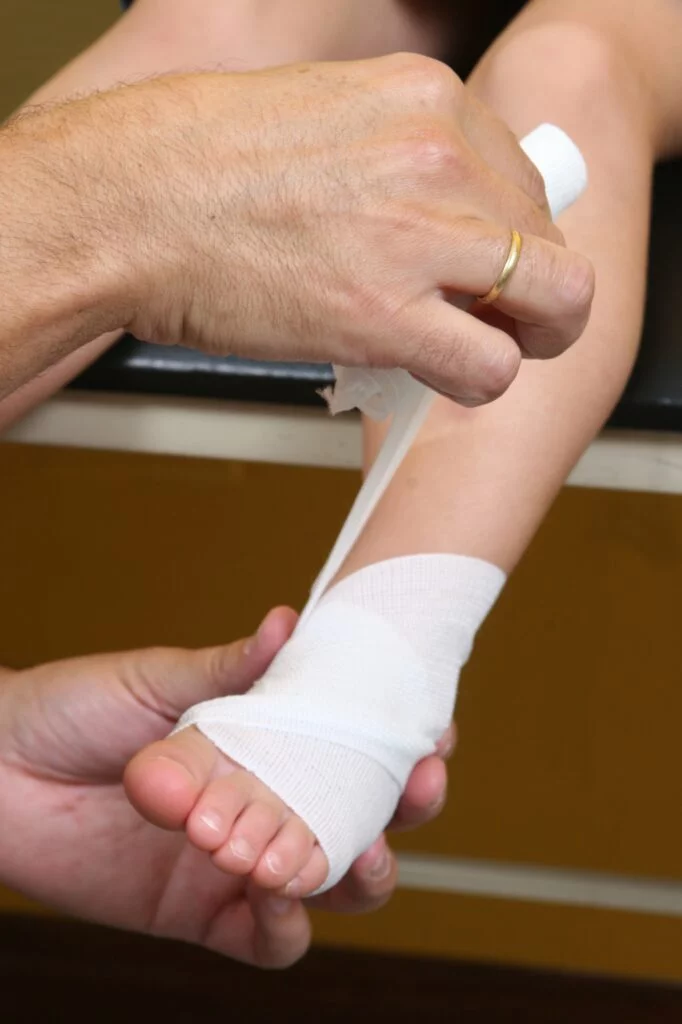Table of Contents
Introduction
Whether you can link persistent knee pain to a specific injury or it just seems to have developed on its own, it’s very important to receive the proper medical care.
There are many potential causes of chronic knee pain, ranging from trauma to rheumatoid arthritis. The sooner that the source of the pain is diagnosed and professionally addressed, the less of an impact it will have on your comfort and mobility in the future.
If you or a loved one is struggling with knee pain, do not wait. Contact us right away and let our specialists help!

When to Come See Us
Sometimes knee pain is the results of a minor injury that resolves after a few days of home care. Other times, there are indications that you shouldn’t even wait that long before reaching out for help.
You should always feel free to call us for any concerns you have about your knees, but any of the following symptoms are signs that you should not hesitate:
- Your pain is severe, whether at rest or trying to walk.
- Your knee has buckled or given out.
- You heard a loud “pop” or other noise at the time of injury.
- Your knee is severely swollen within several hours of an injury.
- You have difficulty straightening your knee.
- Your knee appears to have changed shape.
- There is one specific spot on the knee where you can pinpoint your pain, or is much more tender than others.
- Your knee pain – of any severity – has lasted longer than three days.
Again, please understand that you do not need to exhibit any of the above symptoms to reach out to us. We are always happy to hear patient concerns of any type.
Potential Causes of Knee Pain
The knee is a complex joint that has many supporting features. A number of injuries and conditions can affect it, and our job is get to the root of your problem and treat it in the way that best meets your needs.
Some of the more common causes of knee pain we treat include:
- Ligament injuries, such as ACL, LCL, MCL, and PCL tears
- Meniscus tears
- Arthritis
- Bursitis
- Cysts
- Chondromalacia, a type of “runner’s knee”
- Kneecap dislocation
- Patellar tendonitis, or “jumper’s knee”
Knee pain can often develop as the result of acute trauma or overuse over time. However, other underlying diseases and conditions can also gradually wear away at or aggravate tissues of the knee.
Treatment for Knee Pain
Before moving forward, it’s important we have as clear a diagnosis as possible on what is causing your knee troubles. This will involve a comprehensive examination, including learning more from you about when you started feeling pain, when it is worst, and how it is affecting your life. We might also conduct some imaging tests.
Depending on what we find, we will recommend a course of treatment with the goals of relieving your pain and preventing future problems.
Conservative Treatments
In many cases, knee pain can be effectively reduced or eliminated without the need for invasive surgical treatment. Conservative techniques can include:
- Standard rest and recovery. This will involve a period of time spent off the affected knee, and often includes the use of ice therapy, compression wraps, and elevation as well.
- Orthotics and bracing. Special equipment such as braces or custom orthotics can provide external support to the knee and/or shift excess weight and pressure off of it, giving it more opportunity to heal and helping to prevent future injury.
- Pain management. This can take the form of oral medications or cortisone injections. A single injection may be able to provide relief for up to several months. However, they are not necessarily effective for all patients and should not be considered as a permanent solution.
- Physical therapy. We may recommend specific strengthening stretches or exercises. In some cases, we might refer you to a physical therapist for more extensive treatment.
Surgical Treatments
When conservative treatments fail to provide the results we need (or it is clear from the start that they wouldn’t) we may then turn to surgical methods.
When surgery is being considered, there is often time to weigh all the pros and cons of certain procedures. We will absolutely take the time to answer all questions you may have and provide any information you need to ensure you can move forward in full confidence.
Our doctors are experts in a variety of surgical procedures for the knee. Some of the surgical options we may recommend include:
- Knee arthroscopy
- Knee replacement, whether partial or total
- Knee osteotomy
- Joint restoration
- Knee replacement revisioning
Our goals for surgery will always be to relieve pain and either restore or maintain mobility as best as possible, using the least invasive options available.
Do Not Wait for Proper Knee Pain Help!
The sooner you address your knee pain, the better. Not only will you likely find the relief you need sooner, but the better your odds of the problem not causing any lasting trouble in the future.
Call Premier Podiatry & Orthopedics at (916) 961-3434. We also have telemedicine appointments available if you wish to consult with us before coming in directly.
Laser Treatment for Post-Surgical Recovery
Not only can laser treatment be effective at improving comfort and accelerating recovery of soft tissues; but it can also help prevent the formation of scar tissue.
Use of the Remy laser can also help reduce the risk of complications following surgery by shortening the amount of time you may be vulnerable to infections. Patients can get back to doing what they love sooner and with less to worry about.
The Care You Need, When (and How) You Need It
Looking to schedule an appointment with a physician?
Schedule an appointment with us by calling (916) 961-3434 or by clicking the button below to begin requesting your appointment today!


